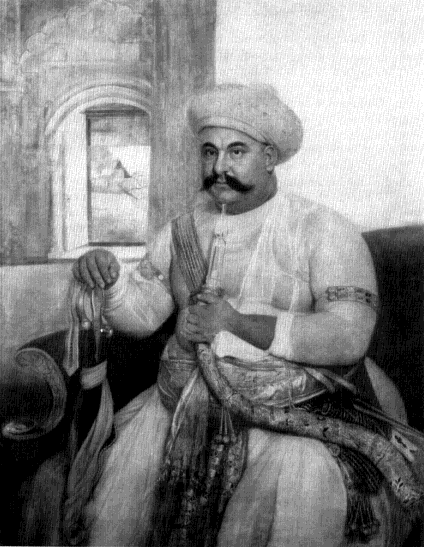Early Religious Policy under Asafu'd-Dawlah
As Shujacu'd-Dawlah's successor, Asafu'd-Dawlah (1775-97), became increasingly a ruler in his own right, and the Mughal Empire no more than a convenient fiction for whoever held Delhi, he reversed the parsimonious policy toward the state subvention of religious scholars and institutions pursued by the first three nawabs of Awadh. Indian traditions of rulership required the nawab to dispense huge amounts of patronage to inferiors and to holy men. Some notables who opposed this new direction were replaced by more amenable Shi‘is. Asafu'd-Dawlah not only reconfirmed long-standing endowments and stipends to Sunni, Shi‘i, and Hindu officials, mendicants, and
[52] Ibid., MS foil 249a ff., Hoey trans., 2:46-47
[53] Ibid., MS foil 246b-247a, Hoey trans, 2 43

Figure 1
Nawab Asafu'd-Dawlah. Courtesy of the British Library.
religious institutions, but restored some that had been usurped. The nawab's religious munificence denoted no streak of puritanism or fanaticism. At least in the early years of his reign, he drank liquor and associated with common Hindus. Indeed, Sunnis and Hindus profited from the policy more than Shi‘is.[54]
Asafu'd-Dawlah grew renowned for bestowing hundreds of thousands of rupees on dervishes. Sayyids, and Shi‘i visitors from the Middle East.[55] The policy served to attract increasing numbers of Shi‘i ulama to the new capital of Lucknow, to which he moved in order to escape the influence of the Faizabad establishment dominated by his father's courtiers and his mother, Bahu Begam. The administrators and civil servants closely related to the nawabate moved with him, but substantial numbers among the service elite remained in Faizabad in the employ of tax-farming and jagir -holding notables.[56]
The Shi‘i ulama in North India still enjoyed few of the advantages that accrued to the Sunni ulama under Mughal rule. Shi‘i scholars, to be sure, did participate in the development of the rational sciences, writing commentaries on the works used in the Nizami method. But just as that syllabus paid relatively little attention to the study of law and oral traditions within the Sunni context, so Shi‘i scholars were seldom well trained in the oral traditions of the Imams, Imami law, and the principles of jurisprudence.[57] As a small minority in a Sunni intellectual world, Shi‘is most often studied with Sunni teachers. Lacking their own mosques and seminaries, they believed that the holding of Friday congregational prayers was illegitimate until the return of the hidden Twelfth Imam, who alone could rightfully lead them. This lack of integrating institutions and physical sites for communal study and worship inhibited the growth of a formal tradition of Shi‘i scholarship in northern India.
Still, a small ulama corps began to form, beginning with scholars who gathered in Faizabad after 1766, attracted by the patronage of the growing Shi‘i notable class there. Shujacu'd-Dawlah summoned the Akhbari Muhammad ‘Askari Jaunpuri to teach Shi‘i sciences in Faizabad.[58] The nawab's wife, Bahu Begam, employed the great and popular teacher Mawlavi Majid Rudauli. Also of note were the legal specialist ‘Ata'u'llah Kashmiri and Sayyid Saricu'd-Din b. Ashraf Mahmud.[59] As was mentioned, these ulama were in many ways subordinate to the court physicians.
[54] Ilahabadi, "Tadhkirat al-‘ulama'," fol 5b.; Asafu'd-Dawlah, "Shuqqah-s," 2 Dhu'l-Hijjah 1188/3 February 1775, Persian MSS 2506, 2507, Regional Archives, Allahabad, Fayzbakhsh, Tarikh-i farahbakhsh , Hoey trans., 2:21
[55] Khayru'd-Din Muhammad Ilahabadi. "‘Ibrat-namah," vol. 2, Persian MS 2210, p 146, Nat'l Archives of India, New Delhi
[56] Naqavi, ‘Imad , p. 126.
[57] "A'inah-'i haqq-nama," foll 60a-b.
[58] Ilahabadi, "Tadhkirat al-‘ulama'," foll 35a-36a
[59] Sultan ‘Ali Husayni Safavi, "Macdan as-sacadah," Soc. Coll., Persian MS 181, foll. 264a-b, Asiatic Soc. Lib., Calcutta.